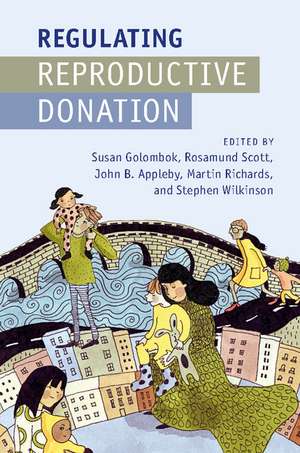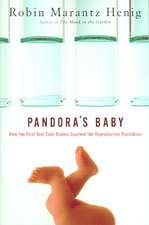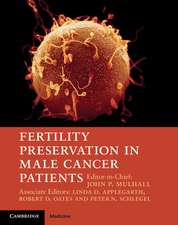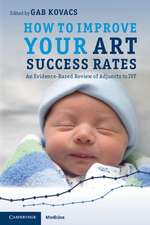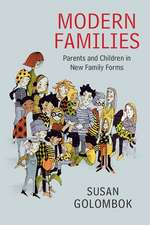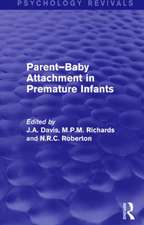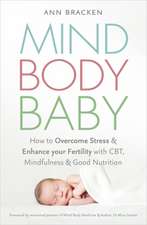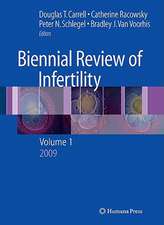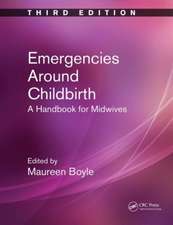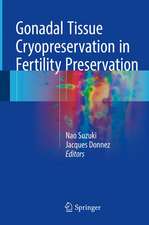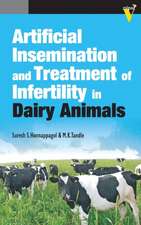Regulating Reproductive Donation
Editat de Susan Golombok, Rosamund Scott, John B. Appleby, Martin Richards, Stephen Wilkinsonen Limba Engleză Hardback – 31 mar 2016
| Toate formatele și edițiile | Preț | Express |
|---|---|---|
| Paperback (1) | 322.29 lei 43-57 zile | |
| Cambridge University Press – 3 ian 2018 | 322.29 lei 43-57 zile | |
| Hardback (1) | 572.28 lei 43-57 zile | |
| Cambridge University Press – 31 mar 2016 | 572.28 lei 43-57 zile |
Preț: 572.28 lei
Preț vechi: 643.01 lei
-11% Nou
Puncte Express: 858
Preț estimativ în valută:
109.52€ • 113.64$ • 91.54£
109.52€ • 113.64$ • 91.54£
Carte tipărită la comandă
Livrare economică 17-31 martie
Preluare comenzi: 021 569.72.76
Specificații
ISBN-13: 9781107090965
ISBN-10: 1107090962
Pagini: 396
Ilustrații: 1 b/w illus.
Dimensiuni: 157 x 235 x 30 mm
Greutate: 0.69 kg
Editura: Cambridge University Press
Colecția Cambridge University Press
Locul publicării:New York, United States
ISBN-10: 1107090962
Pagini: 396
Ilustrații: 1 b/w illus.
Dimensiuni: 157 x 235 x 30 mm
Greutate: 0.69 kg
Editura: Cambridge University Press
Colecția Cambridge University Press
Locul publicării:New York, United States
Cuprins
Introduction Susan Golombok, John B. Appleby, Martin Richards, Rosamund Scott and Stephen Wilkinson; 1. The development of governance and regulation of donor conception in the UK Martin Richards; Part I. International, Cross-border and Global Issues: 2. International regulation and cross-country comparisons Guido Pennings, Robert Klitzman and Fernando Zegers-Hochschild; 3. Legal regulation of family creation through gamete donation: access, identity and parentage Theresa Glennon; 4. Reproductive donation in the context of environmental and global justice Anja J. Karnein and Mattias Iser; 5. Normative and regulatory issues in cross-border reproductive health care Guido Pennings; 6. Surrogacy: issues, concerns, and complexities Vasanti Jadva; 7. A better legal framework for United Kingdom surrogacy? Natalie Gamble; Part II. How Many Children Per Donor?: 8. Sperm donors limited: psychosocial aspects of genetic connections and the regulation of offspring numbers Tabitha Freeman, Vasanti Jadva and Jenna Slutsky; 9. Limiting offspring numbers: can we justify regulation? Katharine Wright; Part III. Donors: Experiences, Motivations and Consent: 10. Regulating the 'good' donor: the expectations and experiences of sperm donors in Denmark and Victoria, Australia Susanna Graham, Sebastian Mohr and Kate Bourne; 11. Gamete donor motives, payment, and child-welfare Stephen Wilkinson; 12. Egg-sharing, motivation and consent: ethical, legal and policy issues Rosamund Scott; Part IV. Information about Donors: The Interests at Stake: 13. Thoughts and feelings about the donor: a family perspective Lucy Blake, Elena Ilioi and Susan Golombok; 14. 'Choosing' a donor: parents' perspectives on current and future donor information provision in clinically assisted reproduction Sophie Zadeh, Susan Imrie and Andrea Braverman; 15. Regulating the provision of donor information to donor-conceived children: is there room for improvement? John B. Appleby; 16. The informational needs of prospective parents: an ethical perspective Bobbie Farsides.
Recenzii
'This excellent interdisciplinary volume clearly combines the empirical research and the theoretical debates, creating ethical discussions that for once are applicable to actual family situations.' Fiona MacCallum, University of Warwick
'Regulating Reproductive Donation is an incredibly interesting read from start to finish. This book would be a suitable addition to an academic legal collection, but also a worthwhile read for legal counsel working in this area to better understand the nuances and intricacies of reproductive donation.' Jennifer Walker, Canadian Law Library Review
'Regulating Reproductive Donation is an incredibly interesting read from start to finish. This book would be a suitable addition to an academic legal collection, but also a worthwhile read for legal counsel working in this area to better understand the nuances and intricacies of reproductive donation.' Jennifer Walker, Canadian Law Library Review
Descriere
Brings together different disciplinary perspectives and new empirical insights to explore the regulation of assisted reproduction around the world.
